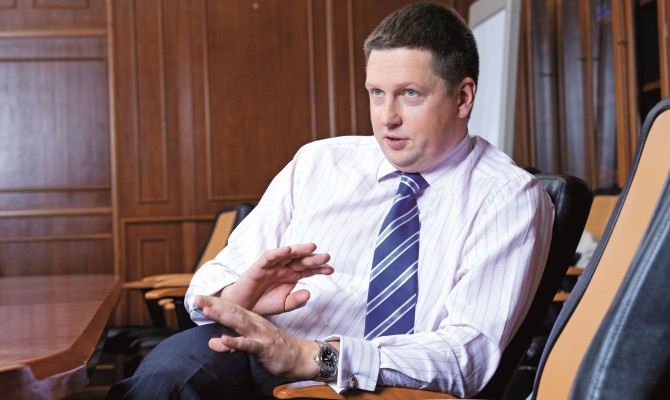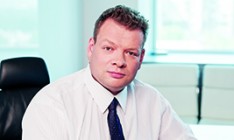Technology
results of the yearIvan Zolochevskiy: “Vodafone is interested in the government’s stand on investments into the Ukrainian market”

In an interview with Capital, General Director of MTS Ukraine Ivan Zolochevskiy told why investments in 3G may not pay back, what options for the attraction of western partners to Ukrainian business have been discussed lately and why 4G may not to be introduced in Ukraine in the foreseeable future.
On operating in the east and in Crimea
- What were the main events on the mobile communication market this year that affected your company?
- There were not that many events, but they were very serious. The first was the loss of Crimea. This is a huge part of traffic for us. We had 2 mn subscribers there.
- And how much are left?
- Only 20,000–25,000 remain in TriMob’s roaming. I think these cards are used mainly for receiving calls. The second event is the war in the east. We witnessed three waves of migration from that region. The first was local migration, specifically when subscribers moved from Luhansk to Slovyansk and from Donetsk to Mariupol. The second wave of migrants moved to Kyiv and central parts of Ukraine. The third wave was migration to Russia and Crimea. We can see SIM cards in the first and second groups. They remain in our own network. We track Russian migration because subscribers use roaming for some time and then they disappear. I believe people simply buy local SIM cards.
- On what terms doers your company work in Crimea?
- In August Crimean K-Telecom provided us with technical roaming for two months. During this time we were trying to agree on further terms of roaming communication. But as there is almost no competition in Crimea (there is only one GSM-operator), our temporary partner was totally impractical. For a call from Crimea to Kyiv we had to pay US $2, while the subscriber did not pay anything for calls within the MTS network. It is easier to work with TriMob, as it is Ukrainian and signed an agreement on national roaming, meaning the rates for domestic calls are lower. However, TriMob’s network does not cover the entire territory.
- Do you think the situation in eastern Ukraine will unwind based on the Crimean scenario?
- I have no idea. But at the moment people are approaching the company saying that now our facilities can be guarded only by companies licensed by the Luhansk People’s Republic, not Ukrainian companies. Apparently, they are somehow trying to rebuild their lives, but the basic idea is that Ukrainian companies have to pay them money. We have no right to do this both from a technical and legal standpoint and we will not do so. This is out of the question. If they want communication they will have to maintain facilities in the conditions in which they exist.
- There were some reports that a local telecommunications operator was created in the DPR. Does it use your framework?
- I am not aware of their plans. We are not able to control such plans. We have only the base stations there, which are served by controllers located in Kharkiv, Zaporizhzhya and Dnipropetrovsk. Those sites at which controllers were installed in Luhansk and Donetsk no longer exist – they were bombed. We repaired only those facilities which have electricity and which we managed to reconnect to Kharkiv. Therefore, approximately 400 of our base stations are still out of service there. Our employees also left those territories. Keeping in mind the situation in Crimea we put forward an absolutely clear condition: either move to the mainland Ukraine and we will support you here, or, in case you decide to stay, quit your job.
- You said that the network in Crimea was sold. How did the company manage to do it?
- We announced a public auction, posted an ad on the web-site and sold everything that remained.
- Who was the buyer? Was it K-Telecom?
- No, K-Telecom was not on the list of bidders. Among the buyers were a few non-Russian foreign companies. I would like to note that we did not sell a fully operating network, but our hardware. Crimean segment was never a full-fledged network. It was always controlled via Kyiv.
On attracting a business partner and 3G project
- Earlier you reported that you might attract additional investors for 3G. Was there any luck in negotiations?
- The talks are very positive. I would prefer not to comment on them – after all, those are negotiations. At the moment, there are no particular agreements.
- What is about Vodafone? Why did your company address the NCSRCI asking whether it was possible to use this brand in Ukraine?
- We have a large cooperation program with Vodafone – since 2008 we had the Agreement on Strategic Partnership. We are in constant communication with the company. Naturally, Vodafone is interested in the events in the country and the government’s stand on private investment in the market. We advised to contact the regulator for the official point of view. Zhyvotovskiy (head of the NCSRCI – Capital) replied to the letter confirming that Ukraine would welcome any private investment from abroad.
- Are you discussing the cooperation system with them?
- We are in talks with many different investors. The scope for negotiations is very broad, ranging from marketing policy and technical solutions to joint construction projects and new additional brands.
- What does the latter mean?
- For example, such projects as Jeans and Djuice, which existed in Ukraine in the past.
- That means you are negotiating introduction of sub-brands to the Ukrainian market?
- Sub-brands and additional brands. For example, for certain target audiences.
- Rumor has it the company has also been in talks with Virgin Mobile…
- We negotiate with many companies. We have even ordered a study for perception of European and American brands in our country.
- So, what are the opinions?
- The sampling frame is quite small (250 subscribers), but there are some interesting peculiarities. I was surprised that subscribers see Vodafone not only as the most well-known foreign brand name, but also the most “Russian” of all Western brands.
- Maybe it is because it’s red?
- Who knows. Anyway, foreigners who come here should take into account local specificity.
- Why does the MTS group still not invest its own money?
- I cannot answer this question, but I believe that the inability is partially due to the ongoing anti-Russian rhetoric.
- Do you think there could be some new players in the 3G tender? For example, Vietnamese Viettel has recently announced its desire to participate in the tender.
- Anyone may participate in the tender. But I strongly doubt that after participation of such companies new networks will be created in the country.
- Alternative to 3G: do you think it will be possible to buy the TriMob company (which already has a license) instead of a license along with the network?
- Perhaps the owners will still try to sell the company, as now the value of TriMob is almost equal to the cost of a license in a tender.
- What can you say about the 3G project given the cost of such licenses?
- It is a very complex project. It seems to be virtually stranded in format and in the political and economic environment in which operators will participate in this project.
- Then why are you taking part in the tender?
- We are still considering our participation.
- Your company has not filed the application yet?
- Not yet.
- Do you think all three operators will be able to afford participation in the competition?
- I do not know. In late spring we gave the regulator our assessment, according to which the most feasible license fee was close to UAH 1 bn. At that time, it was approximately US $100 mn. Since then, the economy has taken a nosedive and the dollar increased in value. Where did the amount of US $200 mn come from? After all, subscribers are still paying operators UAH 40 per month.
- How was it that this year the state raised the price for 3G by several times?
- I believe you should ask the government. I can only guess. I will say one thing: the high price of the license will lead to dramatic changes in pricing on the market and this is a very sensitive issue in the country today… In the meantime, some hotheads offer the same scenario for 4G licensing, forgetting that the average bill for the majority of subscribers in Ukraine is UAH 2… When the country reaches the same economic level as in the UK or Germany and the average bill will be US $40 a month, then we can talk about 4G as an investment project. See for yourself: for LTE within the range of 2.5–2.7 GHz Kyiv will need approximately 15,000 base stations, each costing US $50,000 – 60,000. Can you imagine the size of the market to support such a project?
- Do you think that regulatory agencies pay little attention to dumping on the telecommunications market?
- In European practice up to 70% of cases examined by anti-trust authorities are cases of dumping. However, this is not the case in Ukraine. To say that the regulator will raise prices and prevent attempts at dumping would be a very bold statement. I am looking forward to see what will happen next. I cannot even imagine how the events will develop.
On financial results
- What do you do with the profits from the operations of MTS Ukraine?
- We have decided not to transfer dividends based on results of 2013. The money remains inside the country. This money will be useful for the development of 3G networks.
- What amount is involved?
- The amount is substantial. This money was put aside. On the background of the current events, we continue to show good results and pay sizable taxes. Currently, we have a check for UAH 2.7 bn for 3G (the cost of a license at the recently announced tender). This is a huge amount for 3G in a country in which the economy is going downhill and the industry’s revenues in local currency are in sharp decline due to the devaluation of the hryvnia. At the same time, the cost of equipment in the national currency and the cost of technical support is on the rise and the license fee for radio frequencies doubled this year.
- Did operating profits fall due to this (in Q3 its main index – the OBIDA margin – was 43%, which is 8.5% lower than a year ago)?
- Yes, but this rate was also influenced by one-time additional VAT assessment of roaming. For us the standard fair level of the operating margin is 45–47%, while a year ago this margin was 53–54%. Last year we accumulated undistributed dividends and were willing to invest in the development of the network. In general, I believe that an operating margin of 40% is the limit for mobile operators, below which investments start declining. Telecommunications is one of the most capital-intensive businesses. It requires major long-term investments that have a positive effect on cash flows.
On rising tariffs
- Maybe you should start with double tariffs?
- How is it possible to raise prices in Ukraine even in theory? The year before last the AMCU filed a claim of price increase against, conventionally speaking, 1001st text message by 50%. Its representatives stated that this contravenes the rate of inflation.
- But still, if you are granted the 3G license, what will happen to the rates?
- Our competitor Kyivstar has already made a statement in this regard. It said it would hike its rates. The state has two options: leave the market afloat and give companies a chance to see a return on their investments or prohibit a hike in tariffs without paying attention to the future of the market. The telecom market is an indicator of the economy. When it is mistreated, the economy starts shrinking.
- Presuming that the state chooses the first option and lets you off the leash, what steps will the market players be forced to take?
- At present, all operators have many tariffs with the so-called zero rates. After examination of our subscriber base it turned out that we have hundreds of thousands of customers who pay the maximum of UAH 2 per month. They use only “free” rates. If we raise tariffs by an average of five times, this will mean that we will have to get rid of such subscribers. It is clear that over time the practice of zero tariffs should disappear as such. Now people are not only worrying whether they will be able to use mobile phones, because it costs pennies for them. I saw the results of studies conducted by tobacco companies of people’s thoughts on which sectors they will economize in the current environment. They will save on cigarettes, though mobile communications does not even figure in the top ten. When people ask me whether mobile communications will be cheaper, I find it difficult to answer such a question. There are only two countries in the world where mobile communications are cheaper than in Ukraine – Zimbabwe and Botswana. We offer almost a free product.
On additional business operations
- MTS has niche businesses, such as the remains of Comstar (wired internet, TV). What will the company do with them? Is mobile communications the company’s main direction today?
- Currently, we are focused on mobile communications and will pursue this strategy. If there were any plans for broad diversification, we would look at retail, banks and television…
- What will happen to the CDMA network?
- In case the country switches to 3G, we will develop a special offer for CDMA subscribers and will gradually transfer them to the new network. There will be no point in maintaining a separate CDMA network then, even more so because CDMA equipment turns a profit for the world’s only monopoly – Qualcom. For this reason, CDMA routers cost twice more than GSM routers. The situation with other CDMA equipment is similar. The time will come and this standard will die because there is no competition. Developing 3G–CDMA technologies is a road to nowhere.
- Will you be selling iPhones?
- What is the point when there is no 3G in the country? In addition, the devices are so expensive that there is almost no profit margin from sales. For this reason, such sales in various countries are subsidized.
- In Ukraine iPhones are sold through intermediaries. Are you interested in cooperating with them?
- Why? All the same, these smartphones are used in our networks.






 of the agreement of syndication with Financial Times Limited are strictly prohibited. Use of materials which refers to France-Presse, Reuters, Interfax-Ukraine, Ukrainian News, UNIAN agencies is strictly prohibited. Materials marked
of the agreement of syndication with Financial Times Limited are strictly prohibited. Use of materials which refers to France-Presse, Reuters, Interfax-Ukraine, Ukrainian News, UNIAN agencies is strictly prohibited. Materials marked  are published as advertisements.
are published as advertisements.